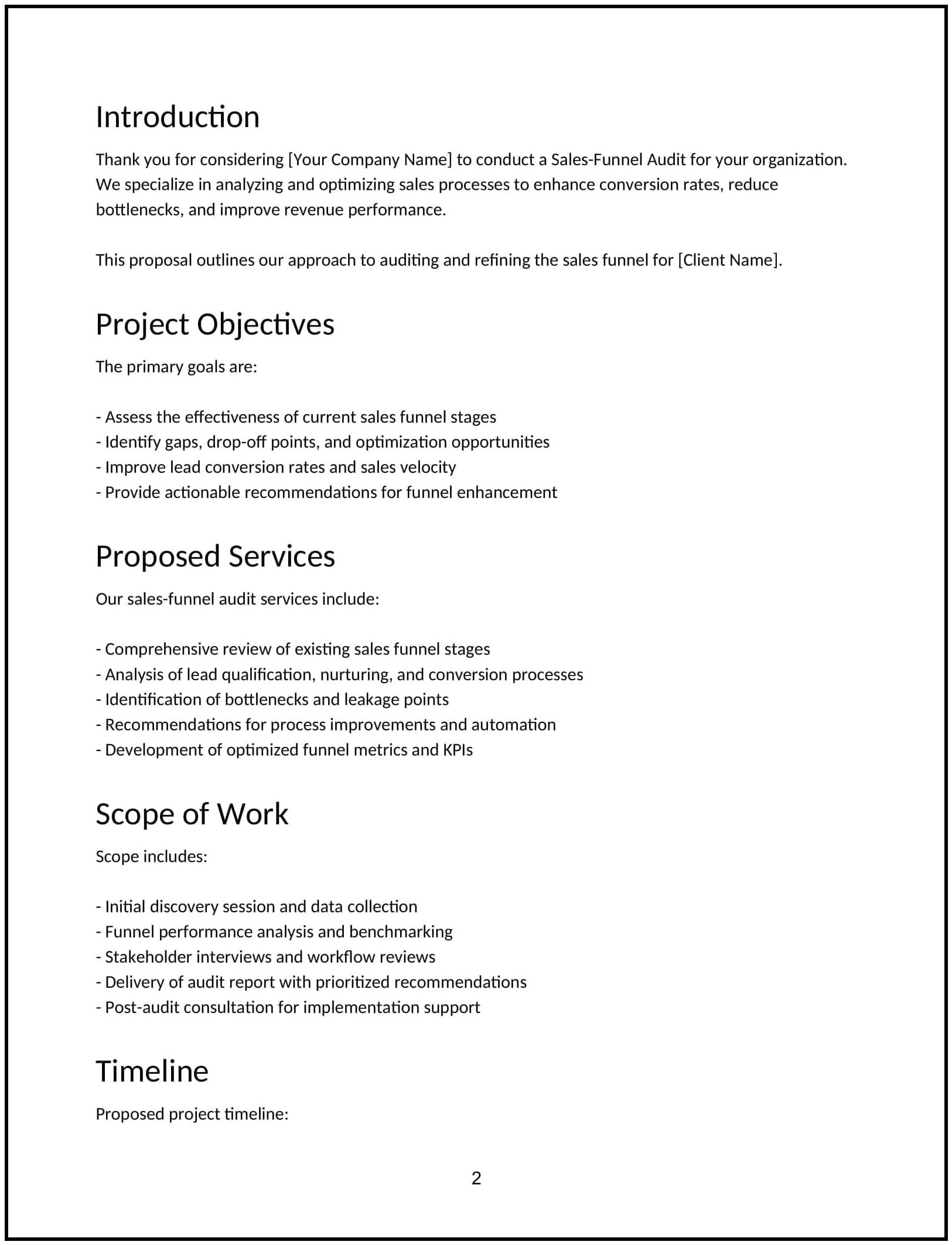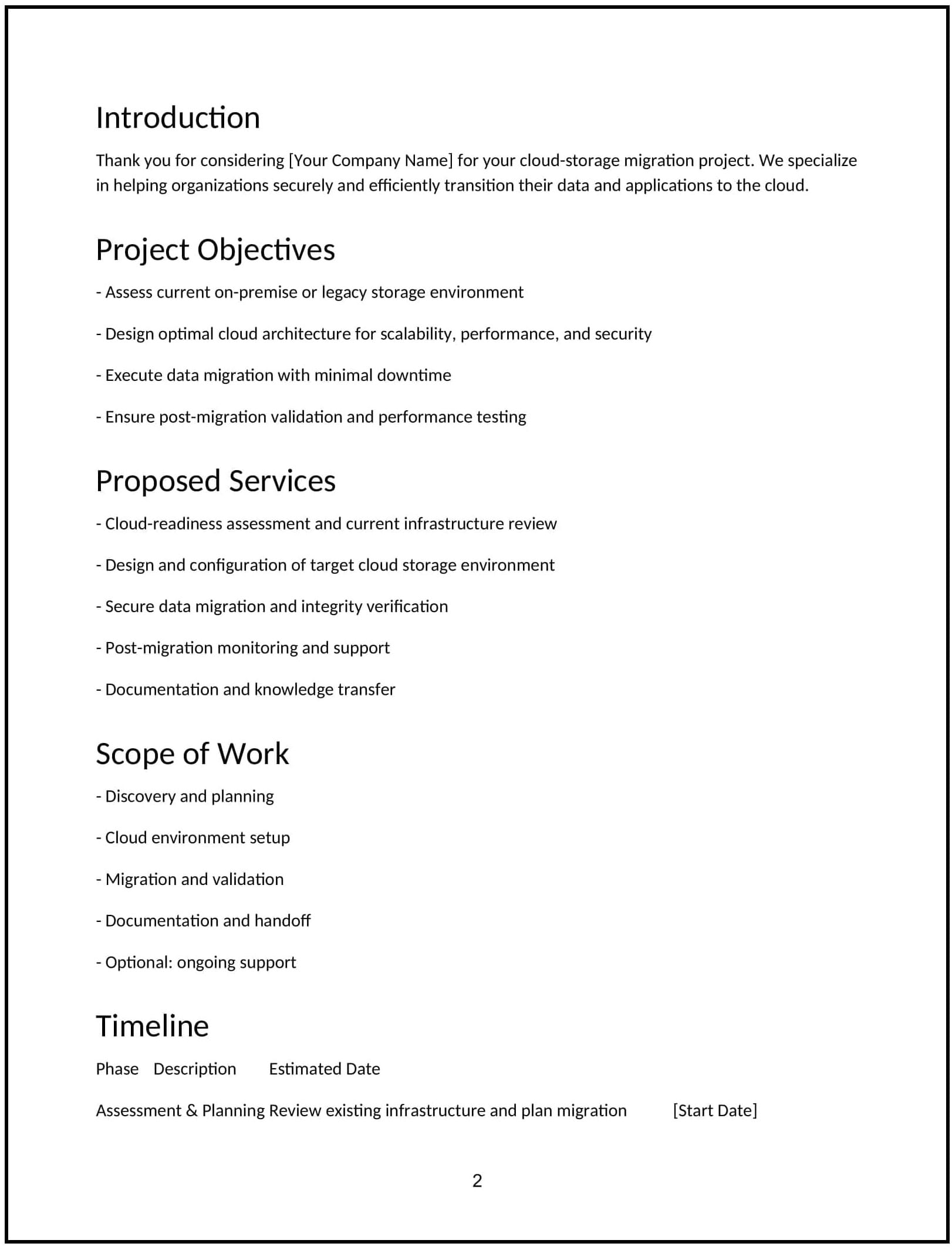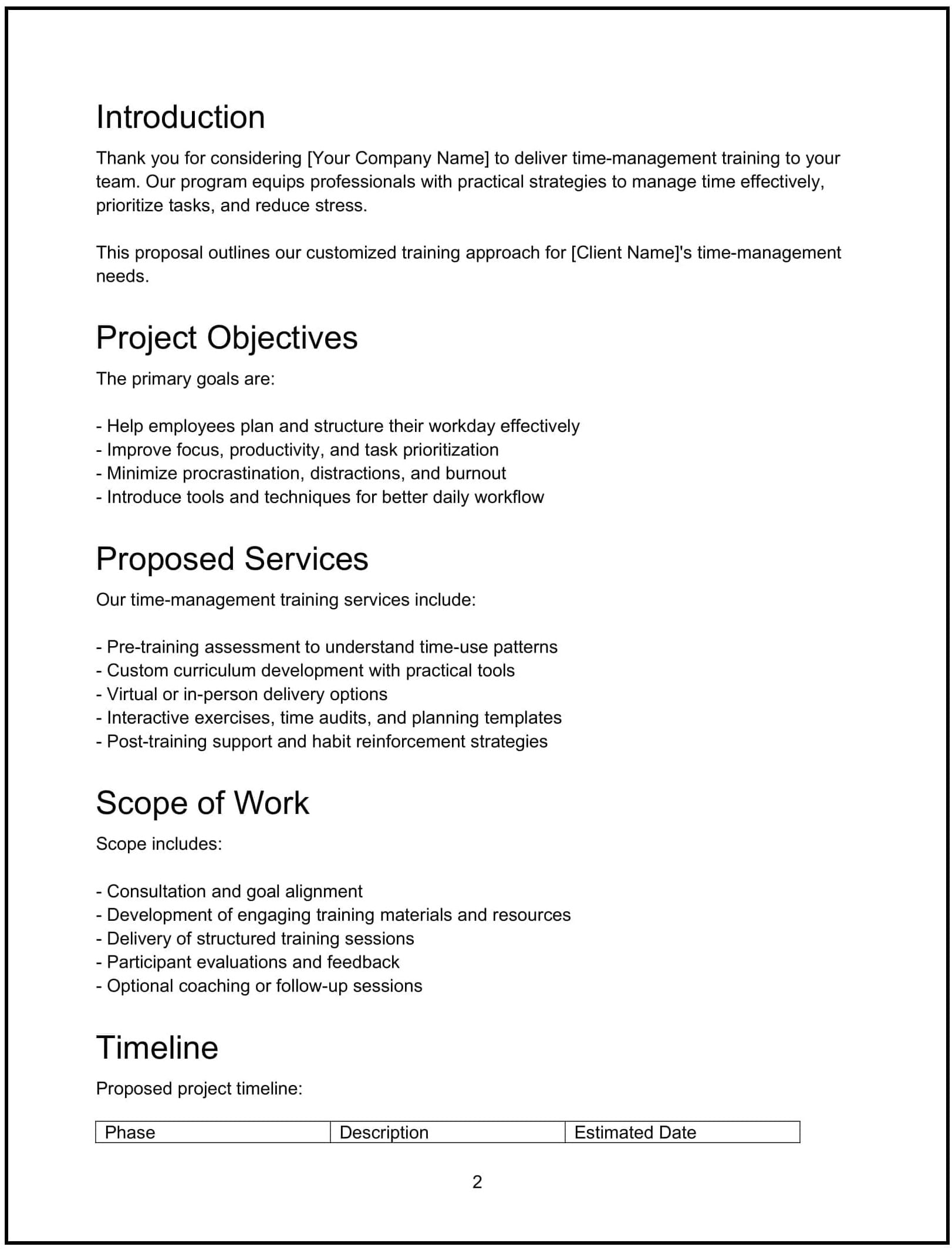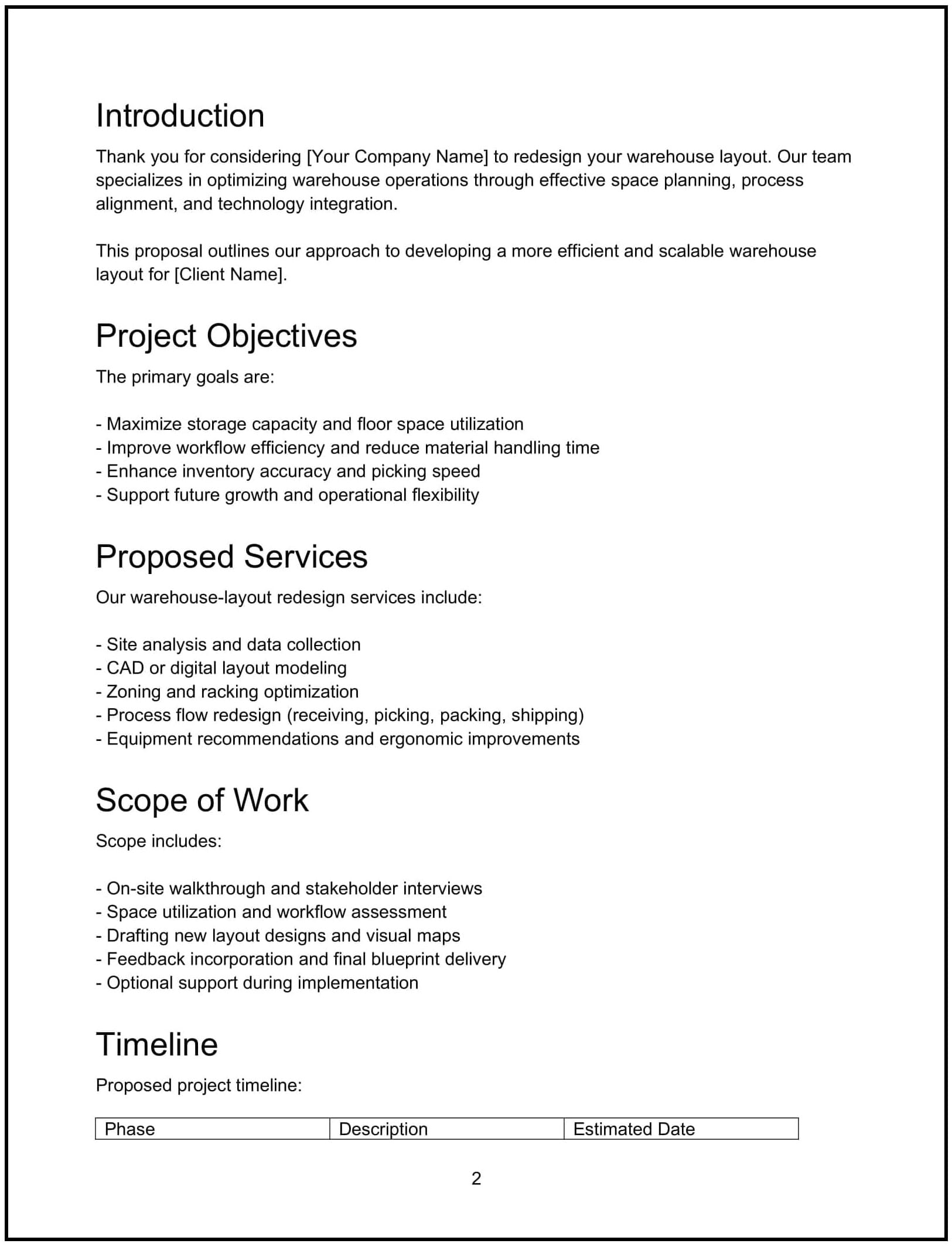Got contracts to review? While you're here for proposals, let Cobrief make contract review effortless—start your free review now.

Customize this template for free
Customize this free sales funnel audit proposal with Cobrief
Open this free sales funnel audit proposal in Cobrief and start editing it instantly using AI. You can adjust the tone, structure, and content based on the client’s funnel complexity, buyer journey, or team maturity. You can also use AI to review your draft — spot gaps, tighten language, and improve clarity before sending.
Once you're done, send, download, or save the proposal in one click — no formatting or setup required.
This template is fully customizable and built for real-world use — ideal for pitching funnel audits to B2B startups, growth teams, RevOps leads, or CROs. Whether you’re diagnosing leaks, improving conversion, or aligning sales and marketing, this version gives you a structured head start and removes the guesswork.
What is a sales funnel audit proposal?
A sales funnel audit proposal outlines your plan to review, diagnose, and optimize the buyer journey from first touch to closed deal. It typically includes an audit of lead stages, conversion rates, CRM workflows, messaging, attribution, and handoff points.
This type of proposal is commonly used:
- When deals are stalling, leads aren’t converting, or pipeline velocity is slow
- To align sales and marketing on definitions, handoffs, and follow-up expectations
- As part of a larger GTM audit, RevOps project, or funnel rebuild
- When a founder or growth team wants faster revenue outcomes without more top-of-funnel spend
It helps clients find out where prospects are falling off — and fix it with real data and clear next steps.
A strong proposal helps you:
- Diagnose drop-offs at each stage — MQL to SQL, SQL to demo, demo to closed
- Spot workflow, messaging, or data issues holding reps back
- Recommend specific fixes tied to conversion lift or velocity gains
- Build dashboards, triggers, or automation to keep the funnel healthy going forward
Why use Cobrief to edit your proposal
Cobrief helps you write sharper, better-structured proposals — fast. No design drama or formatting fluff.
- Edit the proposal directly in your browser: No templates to fix — just focus on the message.
- Rewrite sections with AI: Instantly tailor tone for sales leads, RevOps, or GTM teams.
- Run a one-click AI review: Let AI flag unclear deliverables, vague language, or scope creep.
- Apply AI suggestions instantly: Accept changes line by line or across the whole proposal.
- Share or export instantly: Send your proposal via Cobrief or download a clean PDF or DOCX file.
You’ll go from outline to client-ready proposal with less overhead — and more clarity.
When to use this proposal
Use this sales funnel audit proposal when:
- A client’s funnel is underperforming and no one knows why
- Leads are dropping between stages with no follow-up systems in place
- Sales and marketing teams are misaligned on definitions, tracking, or handoffs
- The CRM is cluttered or doesn’t reflect reality
- The team is scaling and wants to tighten the funnel before investing more in acquisition
It’s especially useful when growth has stalled and the team needs a structured way to fix conversion without just buying more traffic.
What to include in a sales funnel audit proposal
Use this template to walk the client through your funnel review — from audit to action plan — in clear, structured language.
- Project overview: Frame the issue — leaky funnel, slow conversions, weak follow-up — and how your audit will solve it.
- Funnel stages and definitions: Review how leads are defined and moved through the funnel (MQL, SQL, opportunity, closed-won).
- Data quality and CRM setup: Assess whether funnel data is reliable — including fields, stage triggers, source tracking, and deal hygiene.
- Conversion and velocity metrics: Analyze stage-to-stage conversion rates and deal velocity to surface bottlenecks.
- Messaging and content gaps: Identify where reps or campaigns lack supporting materials (e.g., case studies, email sequences, objection handling).
- Sales and marketing alignment: Evaluate SLAs, lead scoring, handoff rules, and SDR/AE collaboration.
- Reporting and dashboards: Check how funnel data is visualized and how consistently it’s used in decisions.
- Recommended fixes: Provide a prioritized roadmap of what to improve — by funnel stage or team owner.
- Timeline and phases: Break the work into phases — audit, findings, recommendations, delivery — with rough durations for each.
- Pricing: Offer fixed-fee pricing for the audit. Include optional add-ons like implementation, retainer support, or dashboard builds.
- Next steps: End with a CTA — such as sharing CRM access, scheduling a kickoff, or providing funnel benchmarks.
How to write an effective sales funnel audit proposal
This proposal should feel structured, tactical, and directly tied to revenue outcomes — especially for time-strapped GTM teams.
- Focus on clarity over jargon: Most clients don’t need RevOps buzzwords — they want faster revenue and fewer leaks.
- Align to ownership: Assign fixes by role — e.g., SDRs, AEs, Marketing Ops — so clients know what action to take.
- Keep it visual and stage-based: Use funnel visuals or stage-specific breakdowns in the final deliverable to drive clarity.
- Be honest about what’s fixable fast: Flag where client behavior (not tooling) is the real issue — and offer realistic plans.
- Avoid fluff “strategy speak”: Anchor everything to conversion, speed, and revenue — not vague “optimization” promises.
Frequently asked questions (FAQs)

Proposes a cloud storage migration plan, outlining data transfer methods, security protocols, access management, and downtime mitigation to ensure a smooth and secure transition.

Proposes a time management training program, outlining prioritization frameworks, scheduling tools, habit-building techniques, and performance tracking to improve productivity and focus.

Proposes a warehouse layout redesign, detailing space utilization strategies, workflow optimization, safety enhancements, and storage system upgrades to improve operational efficiency.